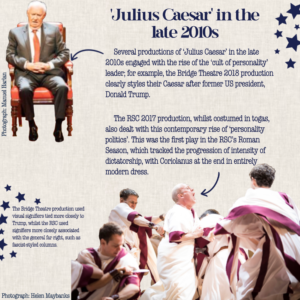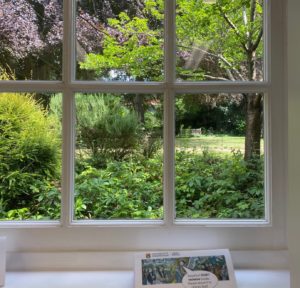I’m Jamie Gorrod, a BA English student going into my second year, and, over a six-week period this summer, I undertook a Collaborative Research Internship within the College of Arts and Law. The project I was part of was ‘Design, Contemporaneity, and Relevance on the Shakespearean Stage’. I was drawn to it not only as an English student, but as a former ‘theatre kid’; I couldn’t wait for the opportunity to explore productions of Shakespeare’s work, to engage with them in what I think is their most affecting form. Shakespeare’s plays can, and should, adapt to fit the current moment, rather than remaining words in a book, dispassionately analysed according to a prescriptive syllabus as they so often are in schools, where many of us first encounter them.
I chose to explore two productions of Julius Caesar, staged within a year of each other in the late 2010s. This was a time of significant political upheaval – Sky News literally said that the decade ‘shook the foundations of British politics’. The political landscape was becoming increasingly more divided, and personality frequently appeared to take precedent over policy when choosing a leader. The Bridge Theatre and the Royal Shakespeare Company productions both took advantage of this political mood to present two very different, and yet thematically similar, productions of Julius Caesar. Both productions examined the cult of the personality leader, and the easy way in which the general population can be encouraged to comply with such a figure.

The Bridge Theatre’s Julius Caesar was in modern dress, with David Calder’s Caesar being very clearly styled after former US president Donald Trump – a fact that was commented on in several reviews at the time. It includes many quick signifiers of contemporary rising far-right ideology, such as the red baseball cap and tie, and the prominence of each characters ‘right to bear arms’ through gun violence; this is a convenient shorthand to indicate the wider topics of increasingly polarised left vs. right conflict, and dictatorship under a charismatic but egotistical and authoritarian leader.
The RSC’s Julius Caesar was costumed in togas, but there were some distinct anachronisms that indicated its interest in rising right-wing ideology, and reactions to that. Notably, the columns were of a neo-Classical style popular with the Nazis, rather than straightforwardly Doric; director Angus Jackson explained that the entire production was ‘essentially modern, they just happened to be in togas’. Clothing each conspirator in the same toga costume also gave them a strong sense of camaraderie, placing the focus on the whole unit and how they functioned rather than any single ‘hero’. The entire ‘Rome’ season explored the progression of intensity of dictatorship from the well-meaning but disorganised liberal elite overthrowing a conservative dictator (Julius Caesar) to a man who is essentially a fascist (Coriolanus). It was, therefore, able to utilise its production of Julius Caesar to highlight the wider themes of the season, whereas the Bridge Theatre was confined to communicating its messages within one play.

One of the best experiences in my internship was the opportunity to interview members of the creative team involved in each production; Bunny Christie, designer of the Bridge Theatre production, and Angus Jackson, director of the RSC production (and season director for the ‘Rome’ season that it was part of.) To hear about the aims of and experiences in each production was fascinating, and helped me develop a far more nuanced understanding of each.
This internship gave me the chance to explore exciting productions of a play I wasn’t particularly familiar with, and improve my knowledge for my second year. Being able to research two productions, from conception to reception, and the way they dealt with their contemporary context whilst maintaining Shakespeare’s own ‘essence’ in the words being performed, was a truly enlightening experience; I enjoyed every second. I also found the fact that this internship gave me an opportunity to hone skills that will be beneficial in my further education particularly useful. Throughout the project, I was able to develop my abilities in independent research, setting specific goals with my supervisor and working towards them, managing my time, and committing my focus to the project.
Jamie Gorrod, BA English
